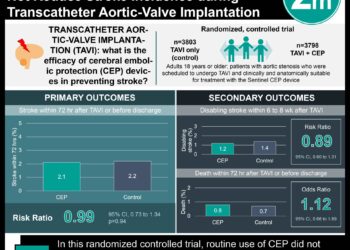Empagliflozin does not decrease risk of hospitalization or death after myocardial infarction
1. In this randomized controlled trial, empagliflozin was not shown to decrease the risk of hospitalization for heart failure or death among patients after acute myocardial infarction (MI).
2. Safety outcomes were generally similar between the empagliflozin and placebo groups.
Evidence Rating Level: 1 (Excellent)
Study Rundown: It is well-established that sodium-glucose cotransporter 2 (SGLT2) inhibitors such as empagliflozin improve cardiovascular outcomes in those with high-risk chronic diseases such as type 2 diabetes, kidney failure, or congestive heart failure. It has also been demonstrated that treatment with empagliflozin is associated with improved cardiac biomarkers such as natriuretic peptide concentration, left ventricular ejection fraction, and cardiac volume among patients who had an MI. However, no studies have directly assessed the clinical outcomes of SGLT2 inhibitor therapy after myocardial infarction. This study, EMPACT-MI, aimed to evaluate whether post-MI patients with a new reduction in left ventricular ejection fraction or symptoms of congestion would benefit from early treatment with empagliflozin. It was found that those who received empagliflozin had a similar risk of a composite primary endpoint (a first hospitalization for heart failure or death from any cause) compared to those who received a placebo. The two groups also had virtually identical safety outcomes; nearly one-quarter of both groups experienced a serious adverse event, and the same percentage had to discontinue the trial regimen. This study was limited by the lack of analysis of outpatient heart failure events, which may have made a meaningful contribution to the total disease burden. In addition, there was a lack of patient diversity, which may have limited the generalizability of the study findings. Overall, this study demonstrated that empagliflozin did not reduce the risk of first hospitalization for heart failure or death compared to placebo.
Click here to read the study in NEJM
In-Depth [randomized controlled trial]: This international, event-driven, double-blind trial involved adults who developed new signs of heart failure (left ventricular ejection fraction less than 45% or symptoms of congestion) after being hospitalized for an acute myocardial infarction. Participants were also required to have at least one additional enrichment factor, such as advanced age, type 2 diabetes mellitus, coronary artery disease, and chronic kidney disease. Eligible patients were randomly assigned in a 1:1 ratio to receive either 10mg of empagliflozin daily or a placebo in addition to standard care. The primary endpoint was a composite of hospitalization for heart failure or all-cause mortality. A total of 6,522 patients underwent randomization; 78.4% met the ejection fraction criterion, and 57.0% met the criteria for congestion. The median duration of follow-up was 17.9 months. A primary endpoint event occurred in 67 of 3260 patients (8.2%) in the empagliflozin group and 298 of 3262 patients (9.1%) in the placebo group (hazard ratio [HR], 0.90; 95% confidence interval [CI], 0.76 to 1.06; p=0.21). However, the group that received empagliflozin did appear to have a lower risk of having a first hospitalization for heart failure (HR, 0.77; 95% CI, 0.60 to 0.98) as well as fewer hospitalizations for heart failure overall (HR, 0.67; 95% CI 0.51 to 0.89). The two groups had similar serious adverse events (23.7% in the treatment group versus 24.7% in the placebo group) and adverse events leading to discontinuation of the trial regimen (3.8% in both groups). In summary, these results show that empagliflozin was comparable to placebo for reducing hospitalizations for heart failure and mortality in patients with acute myocardial infarction.
Image: PD
©2024 2 Minute Medicine, Inc. All rights reserved. No works may be reproduced without expressed written consent from 2 Minute Medicine, Inc. Inquire about licensing here. No article should be construed as medical advice and is not intended as such by the authors or by 2 Minute Medicine, Inc.







